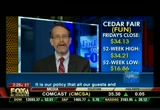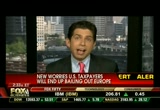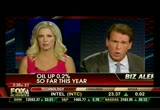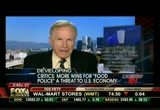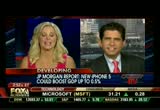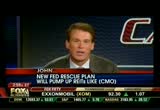tv Cashin In FOX Business September 16, 2012 2:30am-3:00am EDT
2:30 am
>> it makes roller coasters, it runs them, rather. >> morgan, you love them? >> i don't. i think the stock looks like it's one big roller coaster. >> okay. thank you for all those analogies. we appreciate that. that's it for forbes on fox. thanks for watching. keep it right here. cheryl casone and "cashin' in." >> first, the blame game, then the bailout game. remember this? >> since you mentioned north america, this was originated in north america. >> now the president of a european commission is saying this, we can not continue trying to solve europe's problems, with its national solution. the solution is more international rescues. someone here says that means more u.s. tax dollars. well, hello, i'm cheryl casone. welcome it "cashin' in". we have wayne rogers, jonathan,
2:31 am
tracy burns, john, and joining us this week, sally cohen is with us. welcome. tracy, you say this talk of nations coming together to rescue europe is bad for taxpayers in this country. >> cheryl, this whole kumbaya stuff is expensive. we send money to the imf, they send it to europe. is anybody in europe paying attention to the austerity measures? no. everyone keeps saying he did it. no one takes any blame for anything anymore, including here at home. we keep bailing our own selves out. it has to stop or no one is going to fix anything. why should you when you just expect the check is coming in the mail. >> should we be bailing out europe, in fact, because what happens over there keeps killing our markets here. it's been nothing but problems for two years. >> the problem with europe started by greece, they lied about their debt, they never had that 3% level you're supposed to have to get in the e.u. so they don't have anything to go back to. and right now angela merkel is
2:32 am
trying to bail out her own banks through this huge imf bailout. the same thing that happened to aig. once you stuck money in it, it went to banks. that's what they're doing. back door bailout for banks. you've got to let these countries start dealing with it themselves. there is no hope. i don't believe, in my opinion, for greece and probably a couple other countries. >> sally, the bailouts that we've seen, whether it's companies or countries over the last couple of years, overall global taxpayers are frustrated. i mean, do we need to be still helping out europe to save ourselves? do we put the u.s. taxpayer at risk? >> i agree with john, these are all -- most of the plans here are government trying to help their own banks, including banks in the united states. not worrying enough about what's affecting the people on the ground. but the reality is the united states has skin in this game. a fifth of our export economy is dependent on europe and our exports have recently dropped by 11% because of the trouble in europe. so like it or not, and no matter how we got in this mess, we've
2:33 am
got to help solve it. >> jonathan, i made the point earlier that -- >> we're all in this together. that's the dot, dot, dot of what sally was saying. we're all in it together. we got to bail people out, otherwise reality might issue god forbid, assert itself. it always does. all these bailouts have failed. talk about another bailout for greece, greece has already been bailed out two times in the last two years! we have ongoing bailouts to tracy's point, of freddie and fannie, gm, the taxpayers have lost billions. it creates the moral hazard that we talked about, going back to 2007 when this began under the prior to the president. it needs to stop and people need to take responsibility for their own actions. individuals and countries as well. >> wayne, if the imf does for some reason, i don't think they would, pull support from europe, wouldn't that have a negative effect on the united states? aren't we motivated to be there for them? >> you've already got a negative effect. it's just a question of reality. when you allow the political
2:34 am
process to obscure the economic realities, you're just fooling yourself. we've been fooling our self, you keep kicking cans down the road, we've done it in this chris. writing in 1831, when the congress discovers it can bribe the people with its own money, that's the end of the republic. that's exactly what's happening in europe and it's going to happen here. >> tracy, everybody is kind of pointing about the fact this is a complicated issue. but at the end of the day, you know this from the business network, we talk about europe every day. have you changed your mind at all? >> no. because everybody at home is saying, no one bailed me out. no one helped me pay my bills at the ends of the month. why do we help everybody else? i have yet to get that check. that's where people are so frustrated with. >> they created this mess. they had massive parts in play. they were taking massive risks. the government said, look, we're going to put taxpayer money into saving those banks and we're going to continue to let the
2:35 am
people suffer with massive high unemployment, cutting pensions and all of these things. it's unjust. >> but sally, just to make it, you're cool for the bailouts for homeowners, right, that we've seen overt obama administration, hundreds of billions of dollars to bail them out. that's okay, right? if you're going to be against bailouts, let's be against all of them. that's the moral -- >> i definitely think your larger point is right, that we're saying people should take responsibility for their own action, so should government. but we're continually letting businesses cheat the system, rig the rules to work for them and when they get this trouble, we say, oh, you poor thing. >> hold on a second. john, i want to go back to the issue of europe because one of the things he said that kind of caught my attention was he said, this was something that started in north america. it's almost like the europeans are blaming us for their problems and they're coming back to us for more cash, the imf. fair? >> no, it's not fair. but when you blame somebody else, it's what politicians all do. politicians -- look in the
2:36 am
history of the united states, from hamilton and jackson, through the '70s, 80s, '90s and now, you find somebody with a lower approval rating. and lumping all this together as far as pensions and the banks and businesses, that's a political statement right there. there is two separate issues. what we're dealing now is the insolvenessy of europe and what probably needs to be done is split this into two separate e.u.'s because you don't have taxing authority like do you in the united states. mississippi starts to suffer, you have the one government. you don't have that there, you don't have one debt market. >> wayne rogers, let me bring you into this because again, i think the bailout fatigue, that mantra resonates today with u.s. taxpayers and they're nervous about this. >> well, you know, we've all said this. it comes back to the fact that if you allow the political process, because let's face it, they're all crooks in the sense that they need to blame somebody to get themselves into -- no, seriously. i mean it in the best sense of the word.
2:37 am
>> i don't! >> in order to get relie detectorred, they have sell their soul to do that. so they're going to do anything they can to satisfy the public immediately. you talk about the bailouts. here you said, oh, well, president talks about -- we saved the auto industry, we bailed out general motors. we bailed out chrysler. they forget about seeing ford who never took any money, who is very healthy! so it can happen and it be can done the right way without having to penalize the rest of the public. >> jonathan, i want to point out, barraso was saying if they have to come together and operate like the united states, basically a banking authority running everything. that's going to be their issue. but for us, as taxpayers, and market participants like you, this continues to affect our economy. that's a problem. >> it does, cheryl. let them think, though, in -- sink in their own mess. they reap what they sow and the
2:38 am
fact that $100 of some taxpayers money in california, in oklahoma would go to greece, let alone egypt, i think is a crime. >> allall right. guy, great discussion. i appreciate it. coming up, mccaveing the food police. some are worrying what mcdonald's is about to do monday is about to put the nanny state on steroids plus put a -- plus, how apple's new iphone may be proving how bad our may be proving how bad our economy is doing right
2:41 am
2:42 am
>> cheryl: two big victories for the food police this week. mcdonald's announcing it will be posting calorie counts on all of its menus nationwide, that starts on monday. new york city is banning lots of places from selling super sized sodas and other sugary drinks. jonathan, you think the food police will be bad for the economy, bad for jobs. i know you hate it. you got to hate it. >> it frightens me. first of all, there is a direct economic impact. think about all the hundreds of thousands of dollars that's going to be caught to print up the new signage, comply with these new completely arbitrary laws and the fact that new york is passing that asinine beverage sign ban when they mandated the menu signage two years ago, people actually consumed more calories. government control hurts the
2:43 am
problem and the fact that it's imposing more on people's private lives, i think is frightening. >> cheryl: wayne, if you look at the history, mcdonnel's -- mcdonald's ha has been giving us the nutritional information for 30 years. is this really a stretch for mcdonald's to offer it up? >> i don't think that's the danger. the big danger, the one that jonathan is talking about, i think is minor compared to the fact that you're allowing the government to customers you under some -- co- coerce you. the negative thing they're going to regulate clothing because in the wintertime you can catch a cold if you don't wear such and sufficient. the fact that they've inserted themselves into the private lives of american people to this extent under the guise of helping health, which is okay. we all agree with that, but that's a personal choice. it's not up to the government to tell me where i can eat and what i can eat. >> cheryl: okay. sally, here is the choice of mcdonald's, if i want a 20 piece chicken mcnugget, it's
2:44 am
940 calories. i didn't think it was that high. if we go back to some of the founding fathers of capitalism, adam smith said there is an important role for government in helping make sure we have the information as consumers to make informed decisions and that we don't just let capitalism and don't just let markets sort of do exactly whatever they want. we know that -- >> but what about -- >> jonathan, you get a bar of soda, chips, it says the calorie and nutrition count on it. that's because companies voluntarily decided to do it. but because governments said you have to provide that to consumers, that's what incentivizes them to do better. >> all that information is already available. this is an additional cost it people. >> so the 20 piece is 940-calorie, i'm grossed out by it. but it's not going to stop anybody. it doesn't change habits and all it will do is make those 20 pieces that much more money. that's the problem.
2:45 am
it's the people that are now eating at mcdonald's who are going to continue eating there end up paying more. that's where this hurts the economy. >> cheryl: john, what about childhood obesity? that is a major issue. that's the argument on the other side of this is that that's what is driving our health care cost up, for example. >> yeah. childhood obesity, diabetes are causing our country billions of dollars. and it could be hundreds of billions in the very near future. you're not telling some big fat guy that walks into mcdonald's, you can't have a cheese burger. all you're saying is, hey, big fat guy, there is a lot of calories in this that aren't very good for you. and people are still going to work out. mcdonald's has a lot of healthy thing on their menu that a guy can look at and say, maybe i want to eat a salad or go to salad works. maybe i want to go somewhere else and eat. it's matter of choices. we're not stopping anybody. i say we, the government. the government is not stopping anybody from eating something bad. they're saying here are your option. >> cheryl: i don't know about you, wayne, but i'm shocked jonathan isn't chomping on some big mac or fries.
2:46 am
>> once again, i don't think the cost of printing that material is a big danger or anything like that. it's the idea that we're headed towards a fascist regime in which why doesn't the government just mandate is that everybody who is fat have to be a certain weight? you get on the scale and you get taxed. that's what we're coming to. it's insane. >> to jbl's point, he quoted these costs of obesity. that's a cost to those who engage in that risky behavior. i mean, he who writes the checks makes the rules. now you have government paying the cost of health care, we have government telling us to wayne's point, what we can put in our bodies. >> jonathan, it does drive up health care for everybody, whether you have obamacare or these folks visit the emergency room, it drives up the cost of health care for everybody. i think that is indisputable. i understand the slippery slope of government, but i have provenned with the government banning smoking indoors. i think that was great measure. i think there are certain things
2:47 am
the government can do. i understand the slippery slope. but you're saying here are how many calories in a cheese burger. maybe you want a salad. >> cheryl: the argument on -- mcdonald's is a major corporation. but the local restaurant owner, if the government comes in and is dictating to him this kind of detail, that may hurt his business. if we're talking about small business margins. >> of course. >> cheryl: what about that side? >> anything possibly could. this is how we always are balancing in our country because we are a country, we balance individual business interests with what we think is in the best interest of our country, our nation, and people and consumers. look, you could -- >> you can't say the same thing about regulations on smog or water pollution. once upon a time we let companies dump sludge into rivers. >> mcdonald's does have a very healthy menu. >> i think wayne is sitting above me with that look on his face saying, i made the point,
2:48 am
people. you're not listening. this is a slippery slope. you know what? i like a big glop. i want one on occasion. and but i can't now in many times, can i? that's just absurd! ha is not why i live in the united states. >> cheryl: jonathan, last word? >> yeah. i'm sure that a big gulp is like putting sludge into the environment, to sally's point. >> sludge going in me. >> cheryl: wayne is just like, good lord. what am i doing on this show? coming up. >> 'cause we love you, wayne! >> cheryl: calling for apple's iphone 5 to rescue our economy. one report says it can happen. but does that just prove how rotten the economy really the t.
2:52 am
stay with us. >> cheryl: apple day keeps a new recession away? jpmorgan report says apple could single handedly help our nation's economy grow by half a percent. you say this report is proving how bad our economy is doing. how do you figure? >> well, it's pretty frightening. thank the almighty for apple, cheryl. the new products are the atlases holding the economy up. it's a little fried frightening, however, how one economy can have such a dominant impact because there is no reason we couldn't have a dozen apples, two dozen apples. there is an unlimited amount of wealth in this country could be producing. i fear it's a better business environment, it's better economic climate that we need to
2:53 am
get folks producing and make more miracles like apple does. >> cheryl: tracy, do you agree with jonathan or disagree? >> i think it's more about how anemic the numbers are, cheryl. they're so bad these days, that even if you go out and buy one phone, you're going to move gdp because people are sitting on their hands notle to do anything. look, what happened the other day with ben bernanke and him pumping more money into this economy is a sign that he thinks capitalism doesn't work. that's wrong 'cause apple is going to make a difference. people are going to keep buying these products. and ben bernanke is going to continue to deflate our dollar. >> cheryl: sally, what we need is more apples, then, we need more companies. >> yeah. there is a sort of built in paradox to what jonathan and tracy said. clearly apple is succeed not guilty this market and in this economy and in this moment in the united states. and yet, for some reason, other companies can't do it. there is a little bit of a look, if they can do it, then other companies can and if they're not, there is other reasons than just the government enabling environment. the other reality is apple has
2:54 am
been an american success story and on the other hand, the ex tents may be hurting innovation because it's so hard to get into the economy right now. but whatever, they're still a half percent of my only personal gdp expenditures at home. >> cheryl: wayne, is it kind of a sad state of affairs when you have a jpmorgan economist say something like this. is this where we're at now? >> no, it's a reflection on the man's brain. he's an idiot. [ laughter ] here is the case, it's a simple thing. we've had innovation in the united states for years. think in my lifetime you had polaroid which started, had a success, and died. it happens all the time. if we don't have innovation, we won't have anything. apple is just one. there is a loft fanfare about it. look in the medical products area. there are thousands of inventions coming on constantly, new medicines, things like that. it's good for the economy. all of this is good for the economy. it's not just apple. god love them, let them be
2:55 am
successful. i want everybody to be successful. >> cheryl: john, last word? >> wayne is right. numbers don't work on this. $700 billion because of one product, apple does $149 billion total right now. to tracy's point, helicopter bin, it helps if we have cyclical unemployment. we have structural unemployment. so anything like apple that comes out, the key is if you're an entrepreneur, don't copy. create. that's what apple does. >> cheryl: guys, great discussion. thank you, sally, for joining us, good to see you. >> always a pleasure. >> cheryl: coming up, tensions rising in the middle east. will it put your money here in the united states in danger
2:59 am
>> cheryl: it is time for what do i need to know for next week. tracy? >> i once focused on the middle east examine what it's going to do to our markets. not a whole heck of a lot. the only thing moving our market is helicopter ben. >> tracy is right. ben bernanke makes certainly what appears to be an overtly political move. the way to play this ridiculous game is 11% yield. >> wayne rogers? >> i like palomon materials. it's an engineering and application of polymer and it's a growing industry. >> cheryl: okay. thank you very much. jonathan, last one to you. >> bkln is a senior loan portfolio. it actually can go up even interest rates are going up, especially on the short end. ths
111 Views
IN COLLECTIONS
FOX Business Television Archive
Television Archive  Television Archive News Search Service
Television Archive News Search Service 
Uploaded by TV Archive on

 Live Music Archive
Live Music Archive Librivox Free Audio
Librivox Free Audio Metropolitan Museum
Metropolitan Museum Cleveland Museum of Art
Cleveland Museum of Art Internet Arcade
Internet Arcade Console Living Room
Console Living Room Books to Borrow
Books to Borrow Open Library
Open Library TV News
TV News Understanding 9/11
Understanding 9/11